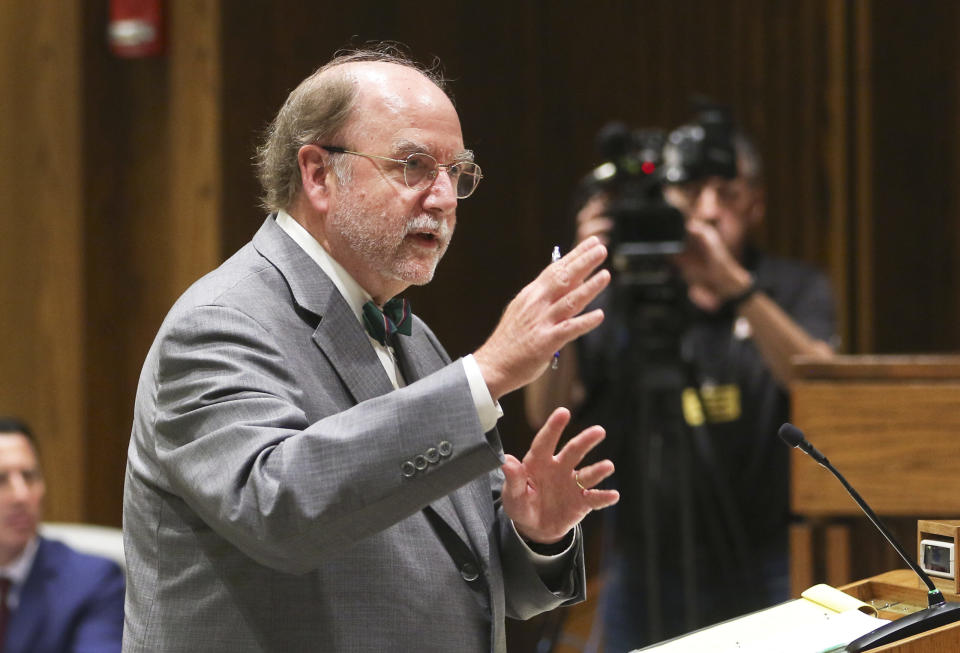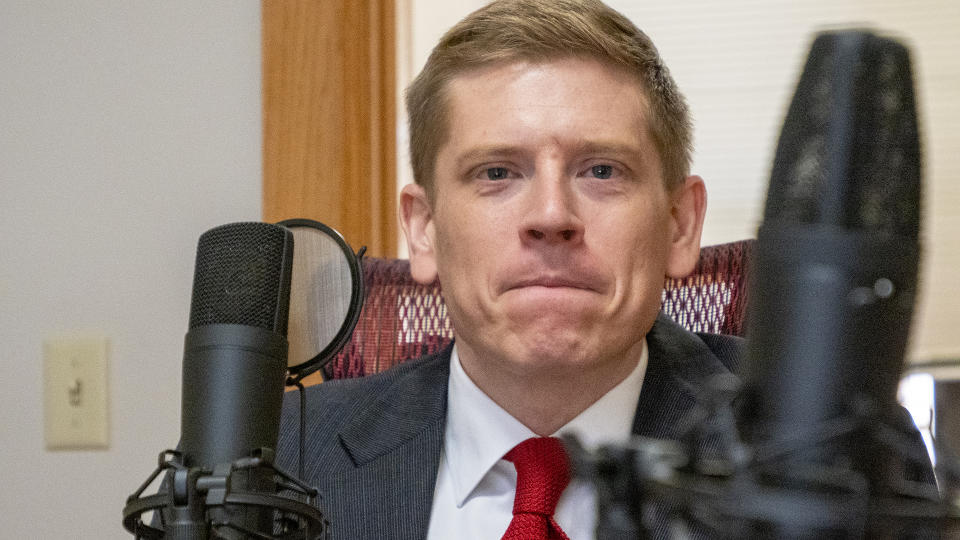Derek Schmidt backs federal version of ‘papers, please’ law that disenfranchised Kansas voters

- Oops!Something went wrong.Please try again later.
- Oops!Something went wrong.Please try again later.
Derek Schmidt, who lost the 2022 election for governor, is now running for the GOP nominee in the 2nd District congressional race. He has thrown his support behind a federal proposal to impose unconstitutional restrictions on prospective voters. (Sherman Smith/Kansas Reflector)
TOPEKA — Congressional candidate Derek Schmidt says proposed changes in federal law that would require voters to prove their citizenship would help “safeguard our elections,” even though he failed to prove that claim in court while trying to defend a Kansas law that disenfranchised tens of thousands of voters.
Schmidt, who is seeking the Republican nomination in the 2nd District, backed legislation introduced by U.S. House Speaker Mike Johnson and other U.S. House Republicans. The law closely resembles a Kansas law that required people to show a birth certificate or other proof of citizenship before registering to vote.
Federal courts determined the law was unconstitutional following a years-long legal battle. Then-Secretary of State and current Attorney General Kris Kobach failed to prove his bogus claims about widespread voter fraud or show how the proof of citizenship requirement would solve a hypothetical problem. Instead, the law blocked more than 35,000 eligible voters from registering.
Schmidt, who was attorney general at the time, oversaw appeals in the case and also failed to prove the law effectively addressed a real problem. The U.S. Supreme Court — including former President Donald Trump’s appointees — refused to consider Schmidt’s final appeal. Schmidt’s office agreed to pay opposing attorneys $1.9 million in legal fees.
But in a series of X posts this week, Schmidt said he would “strongly support commonsense bills like this — to safeguard our elections nationwide, restore confidence in our voting system, and represent the strongly held views of Kansans who supported our state law.”
In a statement for this story, Schmidt said the requirement that only citizens can vote “needs strong enforcement” and that the state law decision only applies in the 10th Circuit, which covers a six-state area.
“There is, indeed, a strong constitutional argument that the U.S. Supreme Court would uphold a federal law of this sort,” Schmidt said.
Jeff Kahrs, his GOP opponent in the race, said “only U.S. citizens should be voting in our elections,” but he stopped short of saying whether he supports the specific law that Schmidt referenced in his tweets.
“We must be prepared to secure elections and know the outcomes properly reflect the will of the voters,” Kahrs said.
Blocking voters
Mark Johnson, an attorney from Kansas City, Missouri, said the proposed federal law would be unconstitutional because, like the Kansas law, it violates the fundamental right to vote.
Johnson proved that point when he represented a University of Kansas student who was blocked from voting because he couldn’t readily retrieve his birth certificate from his parents’ house in Texas. His case was joined with a challenge brought by the American Civil Liberties Union of Kansas, which successfully argued that the federal National Voter Registration Act preempted the Kansas law.
Schmidt supports changes in the NVRA, which would sidestep the ACLU arguments but wouldn’t resolve the problem of denying lawful voters the constitutional right to participate in elections.
“It would result in significant numbers of people who are eligible to vote not being allowed to vote,” Johnson said. “I have to assume that they know what the consequences of these laws will probably be. And yet they go ahead and do it anyway. So are you going to get any of them to say that it’s going to result in people not being allowed to vote, who should be allowed to vote? They’re not going to say that. But I think they know that’s going to be the result. And if they know that’s the result, why are they proposing the bill? You don’t have to be a genius to figure it out.”
The restriction would impact young adults who are trying to register for the first time, the elderly and anybody who moves. Some individuals didn’t have a birth certificate because they were born on a farm or military base, and married women had to provide additional documentation if they had changed their name.
Others, Johnson said, just didn’t have the time or money to obtain a certified copy of their birth certificate.
“Some people say, ‘It’s too much of a pain in the ass. I’m not going to do it,’ ” Johnson said. “And so on balance, they would see it as a benefit for their candidates.”
The proposal backed by Schmidt actually goes further than the Kansas law by criminalizing election workers who mistakenly register someone who isn’t eligible to vote. There is no penalty for refusing to register someone who has a right to vote.
“So what do you think the default is going to be for most election officials? They’ll say no,” Johnson said. “The easiest thing will be to say no, because that way they know they aren’t committing a crime. If they say yes, and they turned out to be wrong, they’ve committed a federal crime.”
The ultra-mega lie
The push by congressional Republicans to require proof of citizenship is tied to baseless claims of voter fraud surrounding the 2020 presidential election. No evidence has been presented in court to support conspiracy theories surrounding former President Donald Trump’s defeat.
Micah Kubic, executive director of the ACLU of Kansas, said the “proof of citizenship” description was a “triumph of branding.” The law is actually a “papers, please” requirement, he said.
And the requirement “remains as illegal, unconstitutional and wrong now as it was 10 years ago” when it was instituted in Kansas, Kubic said.
“All of these lies that are told about our election systems are tied together,” Kubic said. “You know, back then, when Kris Kobach was railing about non-citizen voting, that was a big lie. And then we got the big lie about the 2020 elections. And now we’ve got the ultra-mega lie where these two things have been wrapped up together in one, and made inextricable from each other. They were a lie then, and they’re a lie now.”
In the Kansas case, Kobach could identify only a few examples of non-citizens who had registered to vote. They were the result of administrative errors made by Department of Motor Vehicle staff.
Kobach had insisted the handful of known cases were just the tip of the iceberg, but U.S. District Judge Julie Robinson said his evidence was flawed and untrustworthy.
“The court draws the more obvious conclusion that there is no iceberg; only an icicle, largely created by confusion and administrative error,” Robinson wrote in her ruling.
In his X posts this week, Schmidt said the need to protect election integrity and confidence in voting system is vital to democracy. He said it makes sense to have a federal requirement to prove citizenship.
His point of view seems to have evolved since 2022, when he asked during a campaign event about whether mail-in ballots could be used to cheat. At the time, Schmidt was running for governor.
“Here’s kind of my perspective on it,” Schmidt said. “I think, on the whole, Kansas elections are solid. I really believe that. I’m not saying there’s no problems. I’m saying we don’t have the types of widespread institutional problems — at least I’ve never seen the evidence — that I think some other states do.”
The post Derek Schmidt backs federal version of ‘papers, please’ law that disenfranchised Kansas voters appeared first on Kansas Reflector.



